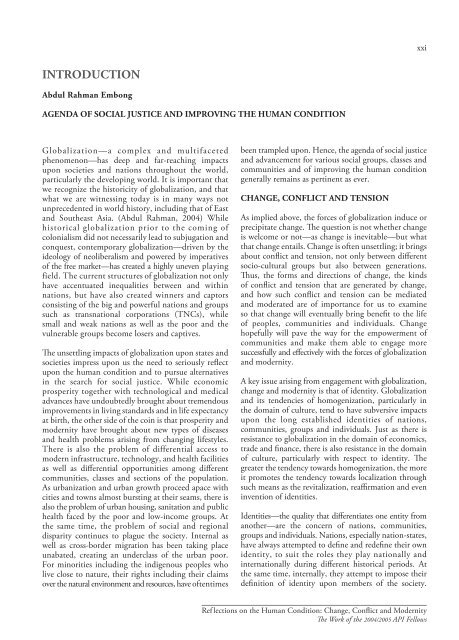Reflections on the Human Condition - Api-fellowships.org
Reflections on the Human Condition - Api-fellowships.org
Reflections on the Human Condition - Api-fellowships.org
You also want an ePaper? Increase the reach of your titles
YUMPU automatically turns print PDFs into web optimized ePapers that Google loves.
INTRODUCTION<br />
Abdul Rahman Emb<strong>on</strong>g<br />
AGENDA OF SOCIAL JUSTICE AND IMPROVING THE HUMAN CONDITION<br />
Globalizati<strong>on</strong>—a complex and multifaceted<br />
phenomen<strong>on</strong>—has deep and far-reaching impacts<br />
up<strong>on</strong> societies and nati<strong>on</strong>s throughout <strong>the</strong> world,<br />
particularly <strong>the</strong> developing world. It is important that<br />
we recognize <strong>the</strong> historicity of globalizati<strong>on</strong>, and that<br />
what we are witnessing today is in many ways not<br />
unprecedented in world history, including that of East<br />
and Sou<strong>the</strong>ast Asia. (Abdul Rahman, 2004) While<br />
historical globalizati<strong>on</strong> prior to <strong>the</strong> coming of<br />
col<strong>on</strong>ialism did not necessarily lead to subjugati<strong>on</strong> and<br />
c<strong>on</strong>quest, c<strong>on</strong>temporary globalizati<strong>on</strong>—driven by <strong>the</strong><br />
ideology of neoliberalism and powered by imperatives<br />
of <strong>the</strong> free market—has created a highly uneven playing<br />
field. The current structures of globalizati<strong>on</strong> not <strong>on</strong>ly<br />
have accentuated inequalities between and within<br />
nati<strong>on</strong>s, but have also created winners and captors<br />
c<strong>on</strong>sisting of <strong>the</strong> big and powerful nati<strong>on</strong>s and groups<br />
such as transnati<strong>on</strong>al corporati<strong>on</strong>s (TNCs), while<br />
small and weak nati<strong>on</strong>s as well as <strong>the</strong> poor and <strong>the</strong><br />
vulnerable groups become losers and captives.<br />
The unsettling impacts of globalizati<strong>on</strong> up<strong>on</strong> states and<br />
societies impress up<strong>on</strong> us <strong>the</strong> need to seriously reflect<br />
up<strong>on</strong> <strong>the</strong> human c<strong>on</strong>diti<strong>on</strong> and to pursue alternatives<br />
in <strong>the</strong> search for social justice. While ec<strong>on</strong>omic<br />
prosperity toge<strong>the</strong>r with technological and medical<br />
advances have undoubtedly brought about tremendous<br />
improvements in living standards and in life expectancy<br />
at birth, <strong>the</strong> o<strong>the</strong>r side of <strong>the</strong> coin is that prosperity and<br />
modernity have brought about new types of diseases<br />
and health problems arising from changing lifestyles.<br />
There is also <strong>the</strong> problem of differential access to<br />
modern infrastructure, technology, and health facilities<br />
as well as differential opportunities am<strong>on</strong>g different<br />
communities, classes and secti<strong>on</strong>s of <strong>the</strong> populati<strong>on</strong>.<br />
As urbanizati<strong>on</strong> and urban growth proceed apace with<br />
cities and towns almost bursting at <strong>the</strong>ir seams, <strong>the</strong>re is<br />
also <strong>the</strong> problem of urban housing, sanitati<strong>on</strong> and public<br />
health faced by <strong>the</strong> poor and low-income groups. At<br />
<strong>the</strong> same time, <strong>the</strong> problem of social and regi<strong>on</strong>al<br />
disparity c<strong>on</strong>tinues to plague <strong>the</strong> society. Internal as<br />
well as cross-border migrati<strong>on</strong> has been taking place<br />
unabated, creating an underclass of <strong>the</strong> urban poor.<br />
For minorities including <strong>the</strong> indigenous peoples who<br />
live close to nature, <strong>the</strong>ir rights including <strong>the</strong>ir claims<br />
over <strong>the</strong> natural envir<strong>on</strong>ment and resources, have oftentimes<br />
been trampled up<strong>on</strong>. Hence, <strong>the</strong> agenda of social justice<br />
and advancement for various social groups, classes and<br />
communities and of improving <strong>the</strong> human c<strong>on</strong>diti<strong>on</strong><br />
generally remains as pertinent as ever.<br />
CHANGE, CONFLICT AND TENSION<br />
As implied above, <strong>the</strong> forces of globalizati<strong>on</strong> induce or<br />
precipitate change. The questi<strong>on</strong> is not whe<strong>the</strong>r change<br />
is welcome or not—as change is inevitable—but what<br />
that change entails. Change is often unsettling; it brings<br />
about c<strong>on</strong>flict and tensi<strong>on</strong>, not <strong>on</strong>ly between different<br />
socio-cultural groups but also between generati<strong>on</strong>s.<br />
Thus, <strong>the</strong> forms and directi<strong>on</strong>s of change, <strong>the</strong> kinds<br />
of c<strong>on</strong>flict and tensi<strong>on</strong> that are generated by change,<br />
and how such c<strong>on</strong>flict and tensi<strong>on</strong> can be mediated<br />
and moderated are of importance for us to examine<br />
so that change will eventually bring benefit to <strong>the</strong> life<br />
of peoples, communities and individuals. Change<br />
hopefully will pave <strong>the</strong> way for <strong>the</strong> empowerment of<br />
communities and make <strong>the</strong>m able to engage more<br />
successfully and effectively with <strong>the</strong> forces of globalizati<strong>on</strong><br />
and modernity.<br />
A key issue arising from engagement with globalizati<strong>on</strong>,<br />
change and modernity is that of identity. Globalizati<strong>on</strong><br />
and its tendencies of homogenizati<strong>on</strong>, particularly in<br />
<strong>the</strong> domain of culture, tend to have subversive impacts<br />
up<strong>on</strong> <strong>the</strong> l<strong>on</strong>g established identities of nati<strong>on</strong>s,<br />
communities, groups and individuals. Just as <strong>the</strong>re is<br />
resistance to globalizati<strong>on</strong> in <strong>the</strong> domain of ec<strong>on</strong>omics,<br />
trade and finance, <strong>the</strong>re is also resistance in <strong>the</strong> domain<br />
of culture, particularly with respect to identity. The<br />
greater <strong>the</strong> tendency towards homogenizati<strong>on</strong>, <strong>the</strong> more<br />
it promotes <strong>the</strong> tendency towards localizati<strong>on</strong> through<br />
such means as <strong>the</strong> revitalizati<strong>on</strong>, reaffirmati<strong>on</strong> and even<br />
inventi<strong>on</strong> of identities.<br />
Identities—<strong>the</strong> quality that differentiates <strong>on</strong>e entity from<br />
ano<strong>the</strong>r—are <strong>the</strong> c<strong>on</strong>cern of nati<strong>on</strong>s, communities,<br />
groups and individuals. Nati<strong>on</strong>s, especially nati<strong>on</strong>-states,<br />
have always attempted to define and redefine <strong>the</strong>ir own<br />
identity, to suit <strong>the</strong> roles <strong>the</strong>y play nati<strong>on</strong>ally and<br />
internati<strong>on</strong>ally during different historical periods. At<br />
<strong>the</strong> same time, internally, <strong>the</strong>y attempt to impose <strong>the</strong>ir<br />
definiti<strong>on</strong> of identity up<strong>on</strong> members of <strong>the</strong> society.<br />
Ref lecti<strong>on</strong>s <strong>on</strong> <strong>the</strong> <strong>Human</strong> C<strong>on</strong>diti<strong>on</strong>: Change, C<strong>on</strong>flict and Modernity<br />
The Work of <strong>the</strong> 2004/2005 API Fellows<br />
21<br />
xxi

















